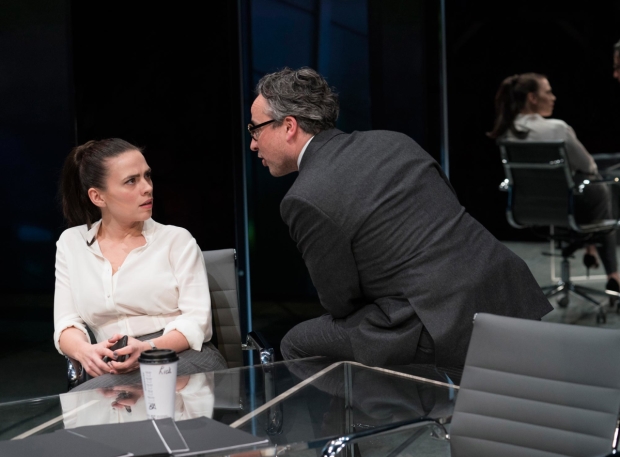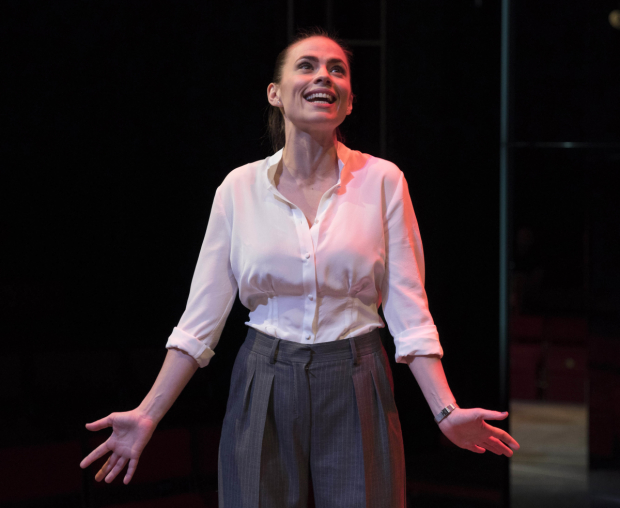Review: Dry Powder (Hampstead Theatre)

©Alastair Muir
Dry powder is the name given to capital in a private equity fund that’s left to play with. I.e money, and usually lots of it. In her finance comedy, American playwright Sarah Burgess demonstrates the shockingly easy toing and froing of huge money transactions. 'Dry Powder?' I hear you ask, 'Surely that’s Dry Play?' Well, yes and no.
Burgess does a good job of getting quite a lot of complicated jargon words out in the first half an hour without confusing people like me, whose crowning mathematical achievement is a B in GCSE maths. The phrases – top quartile, due diligence, leveraged buyout – all roll out and instead of feeling like you’re slowing drowning, a picture begins to emerge.
That picture is of a company where financiers use other people’s money to buy into businesses and then make a lot more money off the back of them. In this swish, glass-fronted office Rick, the head of the firm, and his two founding partners Jenny and Seth are arguing about whether to buy out a little suitcase company Landmark. Seth has set up an amazingly cheap deal, and wants to help make Landmark grow. His workplace nemesis Jenny wants to strip it back: sack almost everyone and outsource the suitcase manufacturing to China. Usually they’d go where the money tells them to, but it just so happens that Rick is suffering from some bad press (he had a huge engagement party on the day he sacked employees from another company) and Seth likes the boss of Landmark. He doesn’t want the company destroyed.
The entire play pivots back and forth over this conundrum, with Hayley Atwell‘s Jenny managing to convince Rick and then Rick swinging more in the direction of Tom Riley’s Seth. Seth is the more humane one, feeling guilty that he’s essentially helping to destroy a family business. Sociopath Jenny, on the other hand, sees the numbers and only the numbers: it doesn’t make financial sense. In this way Burgess lays bare the cut-throat, heartless finance world and how ultimately there’s very little room for humanity.
The problem is that after this initial set up, the play doesn’t really go anywhere. You can see its point coming after the first moments and then it simply runs over it again. There are a few very funny lines, but though we may be temporarily blinded by the patter, soon you realise this is essentially another play about those callous money stooges we all love to hate.
Atwell is the most enjoyable thing about the piece, and Jenny has the funniest moments of the show. She has no life other than the one in the office, doesn’t care for the little people and sees the job as what it is: about making money. But Jenny is really a shell of a part and though Atwell performs it with great timing, she can’t make it anything other than a little clichéd: cold, super-b*tch Jenny.
Aidan McArdle as Rick and Riley do well to keep the dialogue running along and there’s often humour in the three’s interactions. Our sympathies are peaked for Seth and his predicament. But the truth is, his situation is a little improbable: he got into finance, he loves banking, why on earth is he suddenly caring about this company and why is he surprised when the option to effectively destroy it gets put on the table?
Anna Ledwich’s direction ensures the rhythm and speed of the dialogue stays punchy, and leaves it mainly in the hands of the strong ensemble. But the cast can’t hide the piece’s flaws and it ultimately emerges as an unsatisfying evening. Not a sure fire investment by any stretch.
Dry Powder runs at Hampstead Theatre until 3 March.














